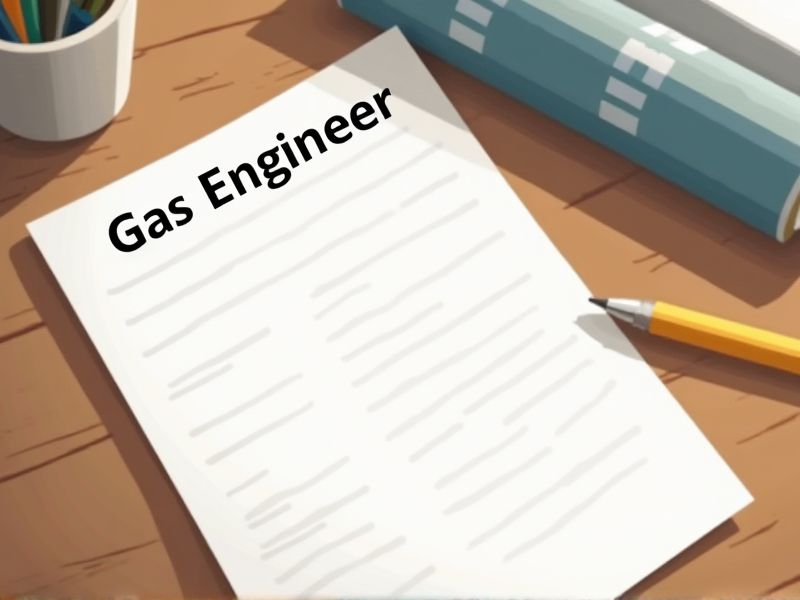
Gas engineers work with potentially hazardous materials, necessitating a high level of technical competence to ensure safety and efficiency. Certifications validate a professional's knowledge and ability to handle gas systems according to industry standards. They also enhance a gas engineer's credibility, which can lead to more employment opportunities and higher earning potential. Below are some key certifications you may require as a Gas Engineer.
Gas Safe Register Certification
The Gas Safe Register Certification is essential for gas engineers because it verifies their competency and ability to work safely with gas appliances and installations. This certification ensures compliance with UK legislation, protecting public safety by preventing accidents and hazardous situations. It also builds consumer trust, as it assures customers that work is conducted according to high safety standards. Employers can easily identify qualified professionals, which streamlines the hiring process and maintains industry standards.
Accredited Gas Engineer Certification
Acquiring an Accredited Gas Engineer Certification ensures that the engineer has met industry standards and possesses the necessary skills to safely handle gas installations. This certification acts as a safeguard for both engineers and customers by minimizing the risk of gas-related accidents. Employers trust certified engineers, leading to increased job opportunities and career growth. Legal and regulatory compliance often mandates such certification, reducing liability issues for both companies and individual engineers.
Certificate III in Gas Fitting
Certificate III in Gas Fitting equips individuals with necessary skills for safe and efficient installation and maintenance of gas systems. It ensures compliance with industry regulations and standards, minimizing risks and accidents. Employers often require this certification for validation of technical proficiency and professional commitment. Legal regulations mandate specific qualifications for gas engineers to promote workplace and public safety.
National Gas Certification Scheme
The National Gas Certification Scheme enhances safety standards by ensuring that gas engineers are properly trained and qualified, reducing the risk of accidents and malfunctions. It instills public confidence in gas services, as customers know they are hiring individuals who meet rigorous industry standards. The scheme also streamlines the regulatory process, providing a centralized system to verify the credentials of engineers. It keeps pace with technological advancements and regulatory changes, ensuring that engineers continually upgrade their skills and knowledge.
Gas Appliance Safety Certification
Gas Appliance Safety Certification is required for gas engineers to ensure they understand and adhere to strict safety standards, reducing the risk of accidents or explosions. Certification confirms the engineer's competence in handling gas systems, which increases public trust and compliance with legal regulations. Without proper certification, gas engineers may lack the essential skills to detect potential hazards and perform maintenance safely. Certification also provides updated training on new technology and safety protocols, vital for adapting to advancements in gas appliances.
Gas Installation & Maintenance Certification
Gas Installation & Maintenance Certification ensures that gas engineers have the necessary knowledge and skills to safely handle gas systems, which significantly reduces the risk of accidents or gas leaks. Certification verifies adherence to industry standards and regulations, ensuring that installations and maintenance meet legal requirements. Employers and clients trust certified gas engineers, which increases job opportunities and enhances professional credibility. Continued certification often requires staying updated with new technologies and methods, fostering ongoing professional development in the field.
ISO 9001 Quality Management Certification
ISO 9001 Quality Management Certification ensures a systematic approach to enhancing customer satisfaction, crucial in a field where safety and reliability are paramount. Gas engineers need to adhere to this certification to maintain consistent quality in service delivery and documentation processes. The certification helps in identifying and minimizing risks associated with gas engineering projects, thus reducing potential operational disruptions. Compliance with ISO 9001 reflects a commitment to regulatory and statutory requirements, fostering trust with clients and stakeholders.
OSHA 30-Hour Construction Safety Certification
The OSHA 30-Hour Construction Safety Certification provides comprehensive safety training that reduces the risk of workplace accidents for gas engineers working in high-hazard environments. It equips them with essential knowledge of safety regulations and protocols, ensuring compliance with federal and industry standards, which is crucial in preventing costly violations and associated penalties. Enhanced safety awareness through this certification leads to a safer work environment, minimizing incidents that can cause harm to personnel and delays in project timelines. Employers value this certification as it demonstrates a commitment to maintaining safety standards, often making certified gas engineers more attractive candidates for construction projects.
NFPA 54 Compliance Certification
Attaining the NFPA 54 Compliance Certification ensures a gas engineer adheres to standardized safety procedures, reducing the risk of gas-related accidents. It provides a comprehensive understanding of safe installation and operation practices for gas systems. Certification significantly boosts the engineer's credibility, which can lead to better job opportunities and professional development. Regulatory bodies often mandate this certification to ensure public safety and maintain consistent engineering standards across the industry.
HAZMAT Operations Certification
Gas engineers often encounter hazardous materials in their work, so HAZMAT Operations Certification ensures they have the necessary skills to safely manage these substances. Without proper training, the likelihood of accidents or exposure to dangerous chemicals increases, endangering both the engineer and the surrounding environment. The certification equips engineers with knowledge on containment, handling, and emergency response to hazardous materials, which is crucial for minimizing risks. Regulatory compliance often mandates this qualification to uphold safety standards in industries dealing with volatile materials.
Summary
As a gas engineer obtaining additional certifications, you can expect enhanced job prospects due to improved qualifications. These certifications typically validate your technical skills, making you more attractive to employers. With this, higher earning potential often follows as certified experts are in demand. Moreover, you gain increased credibility and confidence in handling complex gas systems safely and efficiently.
